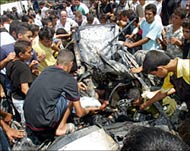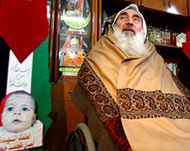Palestinians who help Israeli attacks
Israel’s recent successes against Palestinian resistance groups have once again brought up the question of fifth columnists.

In fact, there is a striking unanimity among Palestinians that the Israeli army could not have killed so many political leaders and resistance fighters had it not been for the “services” of collaborators.
Many in Gaza and the West Bank talk of a bloated army of traitors implanted in every Palestinian town, village and neighbourhood.
Israel’s continued occupation and tight control of all aspects of Palestinian life has greatly facilitated the task of recruiting collaborators.
Who is a collaborator?
According to Ali Rajub, a former interrogator and senior officer in the Palestinian Preventive Security Force (PSF) in the southern West Bank, a collaborator is anybody that knowingly cooperates with the Israeli occupation authorities against the interests of the Palestinian people and their national cause.
Rajub presents five types of collaborators:
First, there is the typical collaborator or informer whose job is to report on people in his immediate area of residence, such as monitoring mosques, colleges and public places.
In this case, the informer reports directly to his Israeli “handler” or indirectly through the head of the local or regional collaborators’ ring.
Then there is the political collaborator who serves the general goals of the Israeli occupation, namely consolidating Israeli control over the populace.
Such collaborators are expected to “pacify” the populace in their respective areas as well as spread the culture of “pragmatism”, meaning, coming to terms with the occupation.
The third category is made up of real-estate dealers who function as secret intermediaries between Palestinian landowners and Jewish interests seeking to appropriate as much Palestinian land as possible.
 |
|
Specific cars are targeted by the |
Next, there are the death-squad collaborators who join Israeli undercover units and take part in apprehending, capturing and executing Palestinian activists.
Finally, there is a fifth category of collaborators known as “asafeer” (sparrows).
The asafeer are planted in crowded prison cells to elicit information from detainees. The plants are instructed to administer beatings in the cells for the purpose of extracting information from inmates.
Recruitment
The Shin Beth, Israel’s domestic intelligence apparatus, uses a variety of tactics to recruit collaborators.
Recruitment often begins with an innocuous summons to the local Shin Beth officer who would evaluate the prospective agent’s “vulnerability” and “susceptibility” and accordingly decide whether to pursue or quit the attempt.
In many cases, the Shin Beth officer would use blackmail to recruit collaborators even in the face of initial stiff resistance.
Sometimes the Shin Beth would force a given person into a dilemma situation whereby he or she would have to choose between the lesser of two evils.
There are numerous instances where the Israeli Civil Administration refused to grant a Palestinian father a travel permit to transfer his sick child to hospital in West Jerusalem unless he agreed to work for the Shin Beth.
During the first Intifada (1987-1992), the Shin Beth used “sexual blackmail” to recruit informers.
In this case, a certain person, usually respected in the community, would be videotaped while in a compromising manner with a prostitute who is often a Shin Beth agent.
The Shin Beth would then use this information to blackmail the victim into collaboration.
First hand experience
Ahmad Salim is a former and presumably repentant collaborator from the Hebron region.
 |
|
Hamas spiritual leader Ahmad |
He explains how the Shin Beth gets a person implicated in this “filthy business”.
“At the beginning, they (Shin Beth) wouldn’t ask you to inform on anybody or do something serious. They would just ask you to do something very petty like counting the number of telephone poles in your street,” he says.
Eventually, counting the number of the telephone poles evolves into something more serious, like monitoring the movement of certain people in the collaborator’s respective area.
By the time the informer becomes deeply involved in “collaboration”, it would be too embarrassing and dangerous for him or her to quit. He or she would feel as if they have no choice but to become an obedient tool to their handler.
Some informers, not able to cope with their guilty conscience, decided to kill their handlers.
Meticulous
During the past few years, especially since the outbreak of the second Palestinian Intifada three years ago, the Shin Beth made meticulous efforts to plant as many informers as possible in the ranks of the resistance groups, especially in the armed wings.
These informers enabled Israel to pinpoint the exact location of the targeted activist and assassinate him, whether he happened to be driving a car or sitting in his office, or even strolling along the promenade by the sea.
Some informers, particularly those planted in Islamic groups, are made to look very religious and pious and memorise portions of the Quran, all in order to gain the confidence of the group leaders and dispel any possible suspicions.
The collaborators are deeply reviled by the Palestinian people and their treachery often costs them their lives.
Retribution
Last summer, Musa Rajub, a collaborator who often bragged about his Israeli connections, was dragged from a jail cell in the cold hours before dawn and shot dead in the centre of Hebron.
|
“They [Shin Beth] would just ask you to do something very petty like counting the number telephone poles in your street” Ahmad Salim, |
The revenge exacted on him came only a few hours after an Israeli attack helicopter fired four missiles into the car of Marwan Zalum, incinerating the local commander of the al-Aqsa Martyrs’ Brigades and a fellow passenger.
Allan Bani Uday, another collaborator from Nablus, paid the same price for helping the Israeli Shin Beth murder his cousin and Hamas activist Ibrahim Bani Udai on 23 November 2000.
He was arrested and executed by a firing squad on 13 January 2000 in the police headquarters in Nablus. His close relatives did not attend the execution and refused to bury his body.
Many other collaborators and suspected informers were snatched from their homes and executed by Intifada activists.
According to Palestinians, however, the problem persists.
It is believed that for every collaborator exposed or killed, five remain entrenched, corroding through the collective body of the Palestinian society.